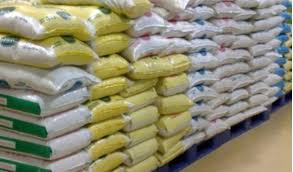By Mackie M. Jalloh
In a bid to alleviate the economic pressures on citizens, the Government of Sierra Leone (GoSL) has announced the establishment of a new pricing formula for rice, a staple food in the country. This decision, effective January 7, 2025, was reached after a high-level meeting involving the Chief Minister, the Ministries of Finance, Agriculture and Food Security, Trade and Industry, the Majority Leader in Parliament, and key rice importers.
The new pricing mechanism aims to provide a fair and stable cost structure for rice, whilst supporting the government’s broader Feed Salone agenda, which prioritizes food security and sustainable agriculture.
The government disclosed that the new pricing formula will be periodically reviewed and updated in collaboration with all major rice importers. The initiative seeks to stabilize rice prices in response to global economic fluctuations, ensuring rice affordability for Sierra Leoneans.
Effective January 7, 2025, the wholesale price for a 50kg bag of parboiled rice will be reduced to NLe 840. This price will drop further to NLe 799 per 50kg bag on February 14, 2025. The Ministry of Trade and Industry will collaborate with rice retailers to ensure that the reductions in wholesale prices translate to lower retail prices, making rice more affordable to consumers at the unit level, such as per cup.
To encourage compliance and promote long-term sustainability, the government has pledged to support rice importers through policies and incentives aligned with the Feed Salone agenda. The support will enhance importers’ capacity to maintain adequate supply chains while adhering to the newly established pricing framework.
The government’s commitment to reducing the wholesale price of rice highlights its proactive approach to addressing food affordability, a critical issue for millions of Sierra Leoneans. The collaboration between the GoSL and rice importers underscores a unified effort to cushion the impacts of global economic challenges such as inflation and supply chain disruptions, on the population.
Rice is a dietary staple in Sierra Leone, and its affordability is vital to the economic well-being of households across the country. With the new pricing structure, citizens can expect a significant reduction in the cost of rice, easing financial pressures on families and improving food accessibility.
The Ministry of Trade and Industry has been tasked with ensuring that the reductions are reflected at the retail level. Such a measure is critical to achieve the intended impact, as it will directly benefit the average consumer. The government also assured the public that it is working on comprehensive macroeconomic and microeconomic policies to promote equity, productivity, and growth across various sectors.
The pricing initiative is part of the government’s larger vision to bolster food security through the Feed Salone agenda. By aligning policies with the needs of importers and consumers, GoSL seeks to create a sustainable and equitable food system that reduces the country’s reliance on imports while promoting local agricultural productivity.
The government’s strategy reflects a balanced approach to immediate and long-term challenges. On one hand, the pricing formula addresses the current economic strain on households, whilst on the other, the incentives for importers lay the groundwork for sustained collaboration and investment in the sector.
GoSL emphasized its commitment to transparency and collaboration in implementing this initiative. By engaging key stakeholders, including rice importers and parliamentary representatives, the government has demonstrated its intent to create inclusive policies that address the needs of all parties.
The government also pledged to regularly review the pricing formula to ensure its relevance in the face of evolving economic conditions. Such a commitment to periodic updates underscores the administration’s adaptability and responsiveness to both local and global factors influencing food prices.
Whilst the initiative has been widely welcomed, its success will largely depend on effective implementation and monitoring. Citizens are looking to the government to ensure that rice retailers comply with the new pricing structure. Any gaps in enforcement could undermine the intended benefits and erode public trust.
Additionally, the government’s promise to support rice importers must be backed by clear and actionable policies to sustain their participation in the initiative, including addressing challenges such as high import costs, logistical hurdles, and currency fluctuations that may affect importers’ operations.
The reduction in rice prices is a significant step towards alleviating the economic burdens faced by Sierra Leoneans. By establishing a new pricing formula and collaborating with key stakeholders, the government has demonstrated its commitment to promoting food security and economic stability.
However, the initiative’s long-term success hinges on effective implementation, sustained support for importers, and the alignment of policies with the Feed Salone agenda.
As Sierra Leone enters 2025, the government’s actions in the coming months will determine whether this ambitious plan can truly deliver on its promise of affordability, equity, and sustainability for all citizens.













